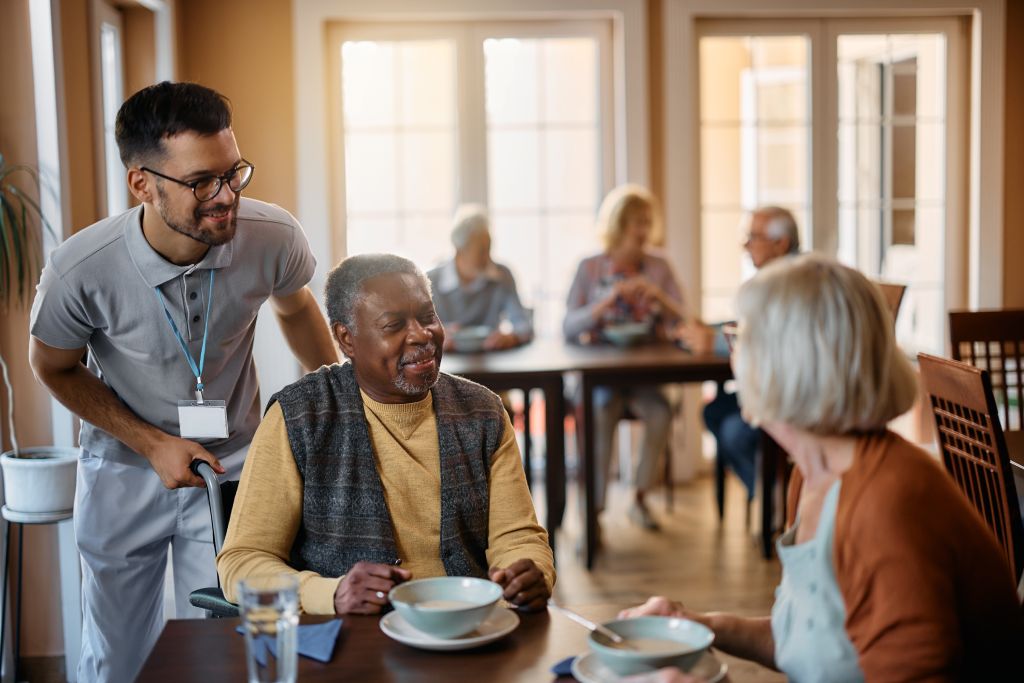Learn about personalized Assisted Living plans for elderly residents.
Learn about personalized Assisted Living plans for elderly residents.
Blog Article
The Value of a Comprehensive Program of Care in Assisted Living Settings
In aided living setups, the application of an extensive program of care is crucial for resolving the diverse needs of residents. Such programs not just incorporate medical and emotional services yet additionally foster social interaction, which is vital for enhancing total health. By prioritizing individualized care strategies and including families at the same time, these programs can substantially improve wellness results and quality of life. The question continues to be: what specific methods can be employed to make sure that these programs are effectively customized to meet the special demands of each resident?
Recognizing Comprehensive Care Programs
As helped living centers proceed to develop, comprehending thorough care programs ends up being crucial for both residents and their households. Comprehensive treatment programs are made to address a variety of demands for people staying in assisted living atmospheres, making sure that each resident obtains customized assistance that mirrors their special wellness problems and way of living choices.

Family members play an essential role in this process, participating in care planning and recurring conversations to guarantee that the resident's demands are continuously satisfied. Comprehending these programs is essential for making notified choices regarding treatment alternatives and maximizing the quality of life for residents in assisted living centers.
Benefits for Homeowners

(Dementia Care Charlotte)One main advantage of comprehensive treatment is the enhancement in wellness end results. Routine monitoring and coordinated treatment aid in the very early detection and management of chronic problems, lowering hospitalizations and emergency interventions. Moreover, locals profit from improved social engagement, as organized activities and programs promote a feeling of neighborhood, combatting sensations of isolation and isolation.
Additionally, homeowners experience enhanced peace of mind, knowing that expert assistance is conveniently available must they need help. This guarantee enables them to focus on enjoying their day-to-day activities and maintaining significant relationships.
Duty of Caregivers
Caretakers play a critical function in the well-being of residents in assisted living facilities, ensuring that their demands are met compassion and proficiency. They act as the main point of contact for citizens, offering necessary assistance in day-to-day tasks such as bathing, clothing, and medicine management. Their existence not only promotes physical wellness yet likewise improves emotional and social wellness by fostering relationships improved trust fund and understanding.
Along with sustaining daily living jobs, caretakers contribute in keeping an eye on adjustments in residents' health and wellness and behavior. They are educated to recognize subtle indicators of distress or decrease, enabling prompt treatments that can protect against complications. Their expertise of each local's special history and preferences allows them to deliver customized care, boosting the total lifestyle.
Furthermore, caregivers work as advocates for citizens, interacting their demands and preferences to various other healthcare experts and member of the family. This campaigning for is essential in creating an all natural treatment atmosphere that values the self-respect and freedom of each person. Eventually, the devotion and skill of caretakers are necessary parts of a thorough program of treatment, underpinning the success of assisted living settings.
Customizing Treatment Program
While every local in assisted living has special needs and preferences, customizing treatment strategies is necessary to delivering effective and personalized support. A one-size-fits-all approach to care can neglect essential facets of specific wellness, possibly leading to suboptimal outcomes. Memory Care. Therefore, an extensive analysis of each resident's health status, personal background, and way of life selections is extremely important in creating tailored treatment techniques.
The personalization procedure includes cooperation among healthcare professionals, caretakers, and relative. By integrating input from all stakeholders, treatment plans can resolve not only medical demands however also emotional and social factors that add to overall lifestyle. Normal evaluations and updates to these plans ensure that they remain pertinent as locals' problems and preferences evolve in time.
(Dementia Care Charlotte)In addition, customized treatment strategies promote a feeling of self-respect and freedom among homeowners, fostering an environment where they feel valued and valued. This tailored method not only boosts the performance of care but likewise strengthens the relationship between caretakers and residents, creating a supportive neighborhood atmosphere. Inevitably, buying individualized treatment planning is a keystone of supplying high-quality assisted living services that meet the varied needs of residents.
Enhancing Area Involvement
Building on the structure of customized care strategies, improving community involvement is an important element of enhancing the total experience for homeowners in assisted living (Memory Care). Energetic involvement in neighborhood activities promotes social links, battles feelings of seclusion, and adds to psychological wellness. Assisting in possibilities for locals to take part in team tasks, such as art classes, gardening, and workout sessions, develops a comprehensive environment that advertises interaction and collaboration
Moreover, incorporating locals right into the broader neighborhood via partnerships with local organizations can supply improving experiences, such as offering and participating in social events. This not just assists locals feel valued yet also reinforces connections with the bordering area, enhancing their sense of belonging.
Additionally, urging family participation in neighborhood tasks is necessary. Assisted Living. Relative can act as important support systems, aiding to link the gap between locals and the neighborhood. Routine family members events and open forums for conversation foster openness and cooperation, making certain that the treatment setting stays receptive to the demands of all stakeholders
Conclusion
In final thought, extensive care programs in assisted living setups play an important role in maximizing residents' health. By attending find out to clinical, psychological, and social needs, these programs not just enhance quality of life yet likewise promote early detection of wellness problems, minimizing the chance of hospital stays. The participation of households in treatment preparation strengthens support networks, cultivating a sensible and autonomous living setting. Ultimately, such programs contribute dramatically to the overall wellness end results and satisfaction of homeowners.
Report this page